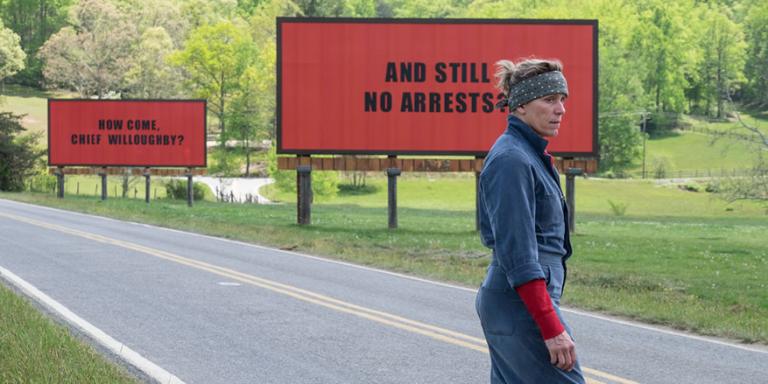
Three Billboards Outside Ebbing, Missouri, ran away with plenty of hardware from the Golden Globes last night, including for Best Drama, and it’s only fitting: In a year filled with so much rage, Three Billboards seemed a fitting entertainment capstone. It’s a Molotov cocktail of a film, filled with fire and fury that seems ready to burn the movie screen down.
But its message goes deeper than that. And I wonder whether some folks are missing its real point.
[Warning: To get to that point, we’ll be getting into spoilers.]The three billboards themselves are indeed provocative. “Raped while dying,” one says; “and still no arrests?” says the second; “how come, Chief Willoughby?”
Grieving mother Mildred Hayes (played by Golden Globe winner Frances McDormand) rented those billboards, challenging that the Ebbing police force to solve her daughter’s murder. It’s a reasonable request: What mom wouldn’t want her daughter’s killer brought to justice? She has every right to expect and demand justice. She has every right, I think, to be angry.
But in calling out Chief Willoughby (Woody Harrelson), a well-respected man dying of cancer, Mildred crosses a line in the town. Instead of dutifully playing the role of a grieving mother, Mildred becomes a pariah. High schoolers throw drinks at her car when she drops her teen son off at school. A dentist seems ready to yank out one of Mildred’s teeth just out of spite.
Dixon (Golden Globe winner Sam Rockwell), one of Willoughby’s deputies, takes the billboards particularly poorly. A racist cop with a penchant for police brutality, he begins his own personal crusade against Mildred, arresting her best friend and threatening Red, the ad man who rented the billboards.
Each provocation leads to retaliation—an ear for an eye, a toe for a tooth. And when Willoughby kills himself in his own horse stable, Dixon’s rage redlines. He stalks over to Red’s office and throws him out a second-story window, then goes out into the middle of the street and beats the bloodied man nearly to death. Someone sets Mildred’s billboards on fire: Mildred responds by firebombing the police station.
Some have called the blisteringly profane Three Billboards “one of the angriest films in recent memory,” and that’s a fair description. And some have pointed to Frances McDormand’s Mildred as something of a feminist hero—an iconic character filled with righteous anger that seems perfect for the rage of the #MeToo movement.
But I think some lose sight of one simple, obvious fact: Mildred isn’t the movie’s hero. Not entirely, anyway. She’s both villain and victim, too—as angry with herself as she ever could be with Chief Willoughby.












